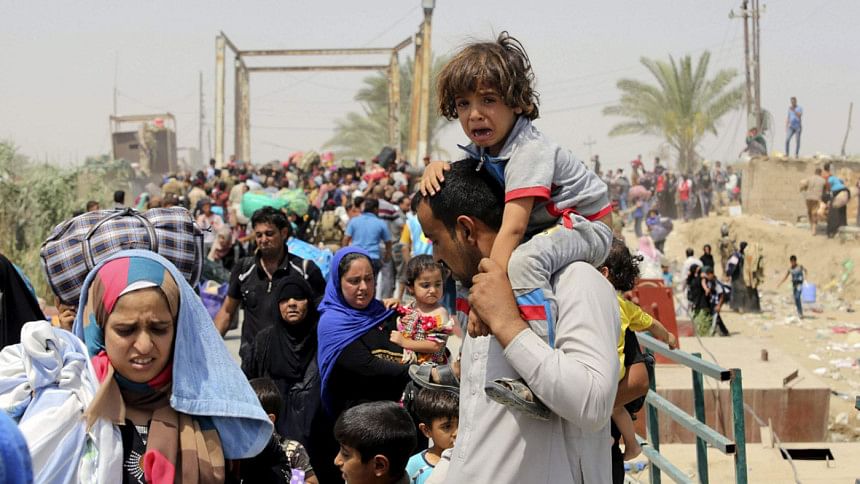Iraq will take back Ramadi from IS 'in days'

Iraqi PM Haider al-Abadi has said that the city of Ramadi could be taken back from Islamic State militants "in days".
But he told the BBC that more support was needed from international coalition partners.
Iraqi forces have suffered a number of defeats at the hands of IS over the past year, and fled from a smaller militant force in Ramadi last week.
US Defence Secretary Ashton Carter said on Sunday that the rout showed Iraqi troops lacked the will to fight.
Carter told CNN's State of the Union that the Iraqis had chosen to withdraw despite the fact that they "vastly outnumbered" IS forces.
Meanwhile the leader of the Lebanese Shia Hezbollah movement, Hassan Nasrallah, said the world faced an unprecedented danger from IS and other Sunni militant groups fighting in Syria.
Speaking to thousands of supporters via video link, he acknowledged for the first time that Hezbollah was fighting throughout Syria in support of embattled President Bashar al-Assad.
Some observers say IS now controls 50 percent of Syria's entire territory - as well as a third of Iraq.
'Small nuclear bomb'
In a BBC interview, Abadi said he was surprised at the US defence secretary's comments.
"[Mr Carter] was very supportive of Iraq and I am sure he was fed with the wrong information," he said.
The prime minister added that his forces were fazed by IS shock tactics.
"They have the will to fight but when they are faced with an onslaught by Daesh [IS] from nowhere... with armoured trucks packed with explosives, the effect of them is like a small nuclear bomb - it gives a very bad effect on our forces," he said.
The Iraqi government has deployed Shia militias to the area to try to stop the IS advance, and Abadi said he was confident that Ramadi could be recaptured.
"It makes my heart bleed because we lost Ramadi, but I can assure you we can bring it back soon," he said.
On Saturday, the militiamen retook Husayba, east of Ramadi, the capital of Anbar province, with heavy fighting continuing in the area on Sunday.
But the prime minister said Iraq needed more international support as many IS fighters were slipping into Iraq from Syria and bringing new tactics to the fight.
"Not controlling Syria-Iraq border more closely was an error. Syria is in chaos which made IS become stronger. We've asked our international coalition partners to tighten control over the border," he said.
Abadi said that Iran and Jordan were providing strong support against terrorism but that although "the Gulf states feel the threat", they were not dealing with it "realistically".
The US has invested in a policy of training and arming the Iraqi forces since it withdrew its combat troops at the end of 2011.
But Iraqi forces have on several occasions surrendered US-supplied materiel to IS.
Carter said the situation in Ramadi was "very concerning".
"We can give them training, we can give them equipment - we obviously can't give them the will to fight."

 For all latest news, follow The Daily Star's Google News channel.
For all latest news, follow The Daily Star's Google News channel. 



Comments